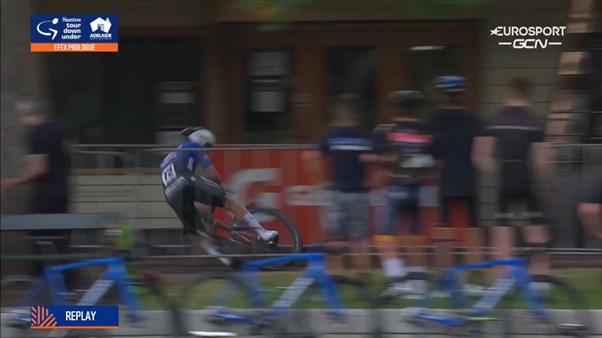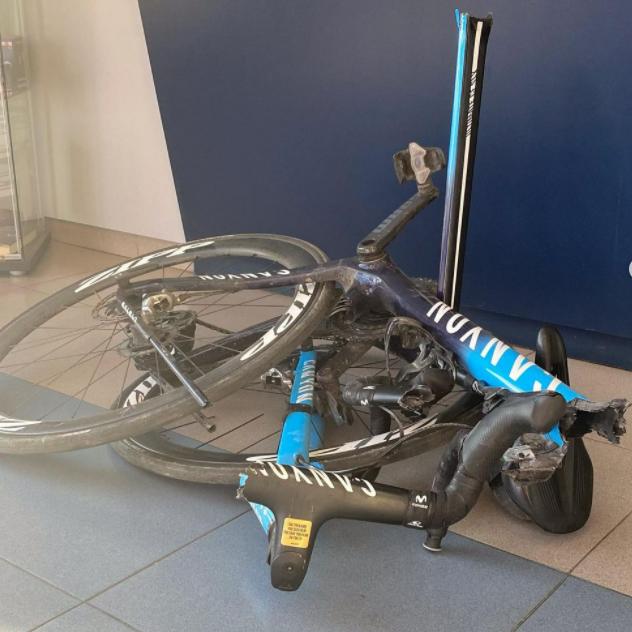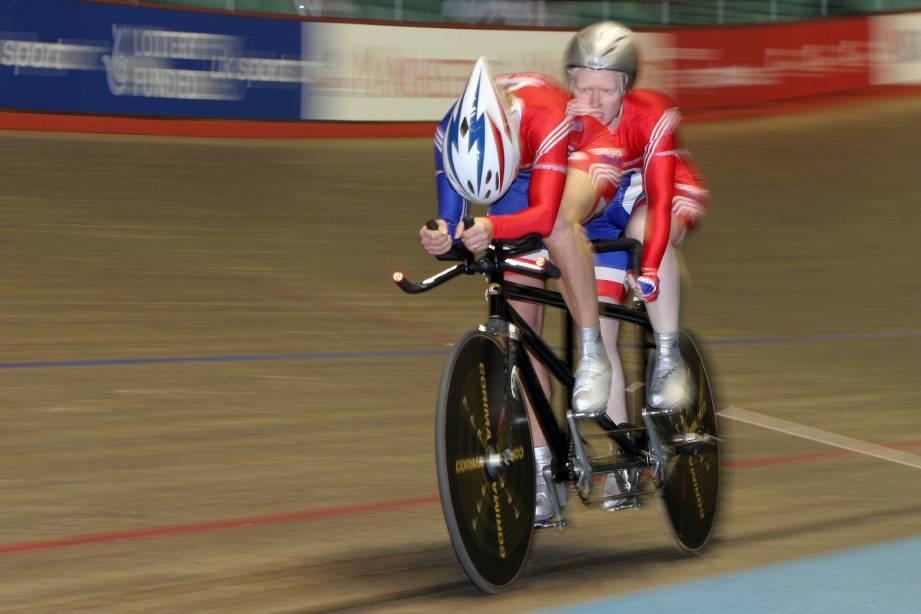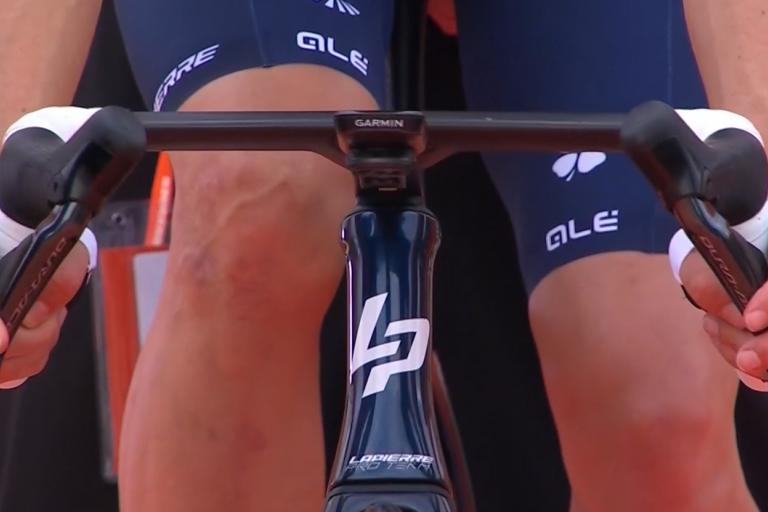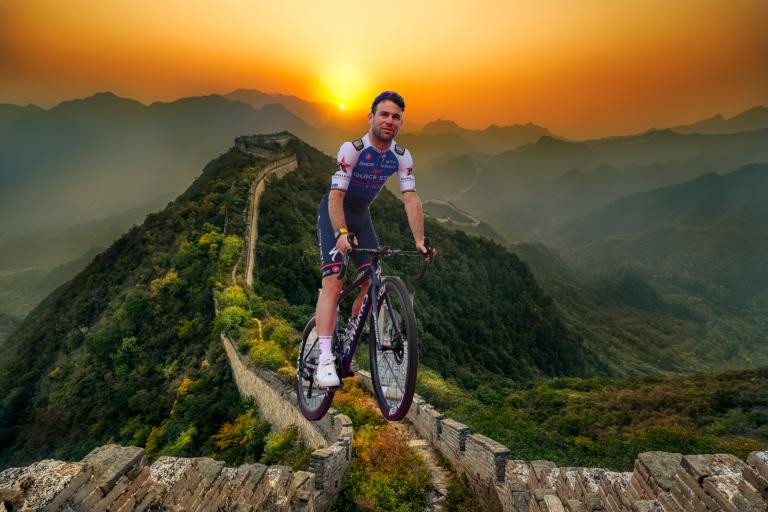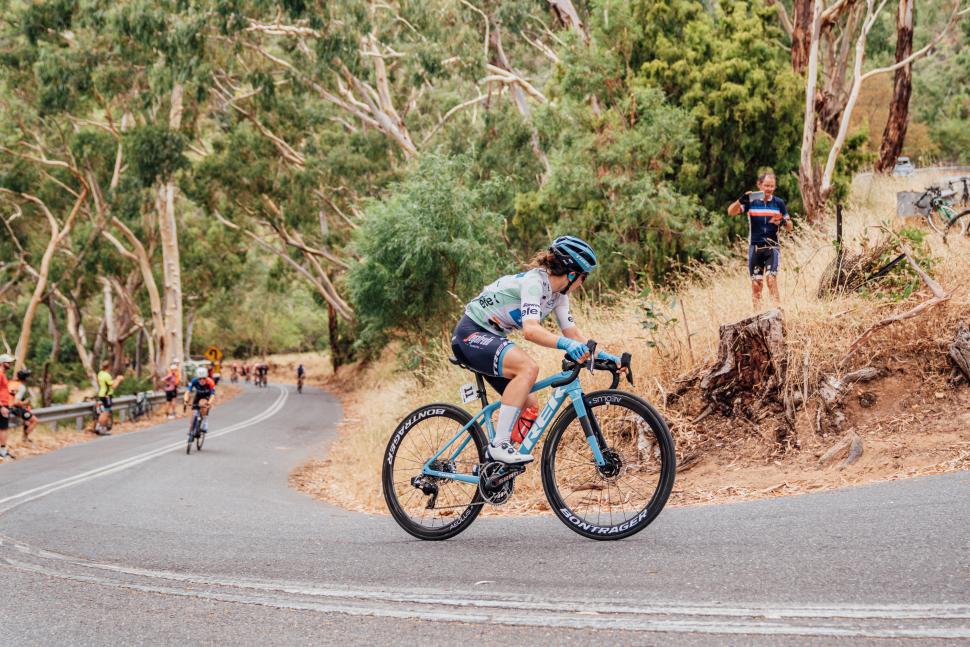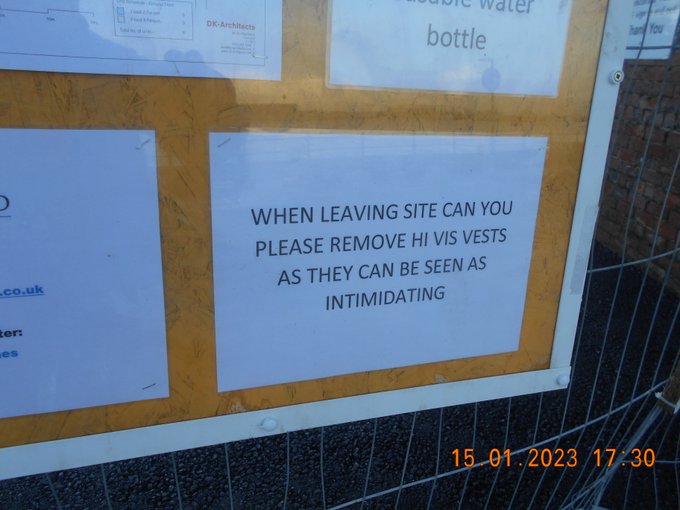- News
- Reviews
- Bikes
- Accessories
- Accessories - misc
- Computer mounts
- Bags
- Bar ends
- Bike bags & cases
- Bottle cages
- Bottles
- Cameras
- Car racks
- Child seats
- Computers
- Glasses
- GPS units
- Helmets
- Lights - front
- Lights - rear
- Lights - sets
- Locks
- Mirrors
- Mudguards
- Racks
- Pumps & CO2 inflators
- Puncture kits
- Reflectives
- Smart watches
- Stands and racks
- Trailers
- Clothing
- Components
- Bar tape & grips
- Bottom brackets
- Brake & gear cables
- Brake & STI levers
- Brake pads & spares
- Brakes
- Cassettes & freewheels
- Chains
- Chainsets & chainrings
- Derailleurs - front
- Derailleurs - rear
- Forks
- Gear levers & shifters
- Groupsets
- Handlebars & extensions
- Headsets
- Hubs
- Inner tubes
- Pedals
- Quick releases & skewers
- Saddles
- Seatposts
- Stems
- Wheels
- Tyres
- Health, fitness and nutrition
- Tools and workshop
- Miscellaneous
- Tubeless valves
- Buyers Guides
- Features
- Forum
- Recommends
- Podcast
news
“It comes pre-crashed”: Pello Bilbao’s “extreme, comically absurd” handlebars divide opinion; Remco Evenepoel tells amateur to stop following him during interval session; “It’s a miracle I’m still alive”, says pro hit by van driver + more on the live blog
SUMMARY
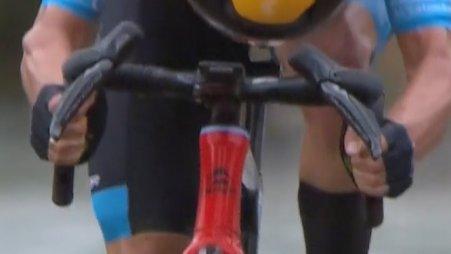 Pello Bilbao's handlebars, Tour Down Under (GCN)
Pello Bilbao's handlebars, Tour Down Under (GCN)17 January 2023, 09:53
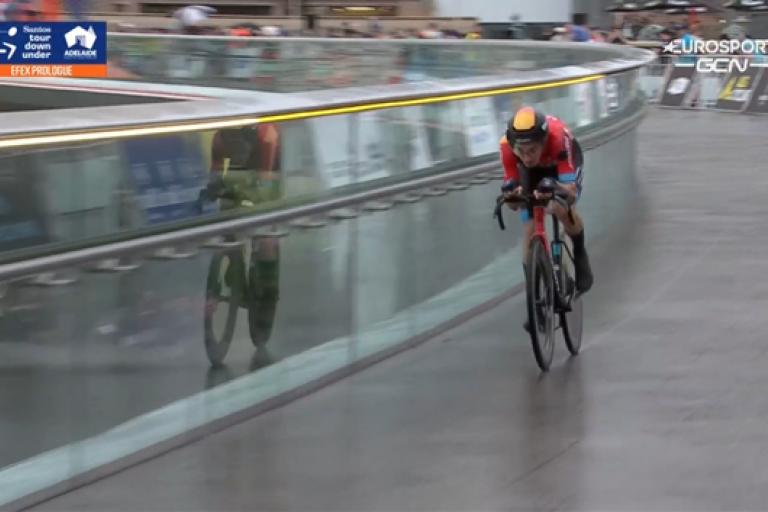
“It comes pre crashed – saves time that way”: Funky handlebars, torrential rain, chin straps, and crashes at the Tour Down Under
It feels quite strange writing about a live bike race at this time of the morning – especially a prologue, of all things – but I’ll give it a go.
The men’s Tour Down Under got underway at 7.30am, or teatime in Australia, with a short 5.5km prologue time trial in Adelaide, a rarity for the annual road season curtain raiser (and don’t worry, I’ll get to the dramatic finale of the women’s race in a moment).
Who knew a 5.5k prologue ride could be filled with this much drama? The rain, the stacks and spills, the triumphs! But none as triumphant as efex Prologue winner, Alberto Bettiol for @EFprocycling
efex | @SantosLtd #TourDownUnder pic.twitter.com/Yq5b0WHYHE
— Santos Tour Down Under 🚴🚴♀️ (@tourdownunder) January 17, 2023
And since we’re not used to individual efforts against the clock down under, it’s been a bit of a weird (and dramatic) one.
For starters, the organisers and host broadcaster seemingly failed to twig that we were supposed to be watching a TT, and neglected to include any helpful finish line graphics (or any running times at all), forcing poor ol’ Adam Blythe to rely on the electronic clock on the gantry above the riders.
Would be good if the race organisers could get the graphics up to tell us what time the riders have done #TourDownUnder
— Tim Bonville-Ginn (@TimBonvilleGinn) January 17, 2023
Meanwhile, as the hassle and expense of shipping a load of time trial bikes for under seven minutes of racing just isn’t worth it for the European teams, we’ve also been treated to the sight of road bikes with disc wheels and even the return of Specialized’s aero snood – which looks even more ridiculous when you’re riding on the drops.
Road bikes with disc wheels. SO COOL. #tdu2023
— Simon Warren (@100Climbs) January 17, 2023
Daft Punk are back pic.twitter.com/Y39fsSA9wJ
— Cycling out of context (@OutOfCycling) January 17, 2023
And then, just to cap off the absurdity, Bahrain Victorious rider Pello Bilbao rocked up with the most stupidly in-turned handlebars you’re likely to see in 2023.
Dear God...
I know, I know, he’s trying to mimic the effects of his usual TT bars, as well as slyly, if legally, contravening the UCI’s banning of the infamous ‘puppy paws’ position and the governing body’s new law on minimum handlebar width – but it’s still awful.
Bilbao’s team car was also noticeably close behind him at certain points, despite the UCI’s statement about that very wind cheating tactic yesterday, though I reckon everyone was too distracted by his funky bars to care too much.
> UCI clamps down on narrow handlebars, pin-less number pockets and support car trickery
WOW, missed them. Now that is extreme!
— Simon Warren (@100Climbs) January 17, 2023
However, I think it’s safe to say that not everyone is a fan of Pello’s faux-puppy paws handlebars, at least for purely aesthetic reasons:
— Wishing I was pedaling (@DavidRafferton) January 17, 2023
It comes pre crashed - saves time that way
— Wishing I was pedaling (@DavidRafferton) January 17, 2023
And speaking of crashes, the torrential rain that engulfed Adelaide shortly after the time trial started (rain in Australia, who knew?) led to several riders hitting the deck on the slippery looking course.
In fact, Mikkel Honoré, Chris Hamilton, Sean Quinn, Jensen Plowright, and Tim van Dijke all crashed on the same treacherous left-hand corner near the finish as the rain pummelled down, while potential GC contender Alessandro Covi also crashed.
Oh, and before I forget, EF-Education-EasyPost’s 2019 Tour of Flanders winner Alberto Bettiol took advantage of the early dry conditions to win the stage, eight seconds ahead of the extremely impressive Ineos Grenadier Magnus Sheffield, who did have to tackle the wet conditions.
Both Sheffield and Bettiol are on my Fantasy League team. Just saying…
17 January 2023, 11:44
“Let them work and give them their space”: Remco Evenepoel tells amateur to stop following him during interval session
You know the feeling, when you’re trying to get some work done and someone’s peering over your shoulder, keeping an eye on what you’re doing, distracting you from the task at hand…
Well, that's how Remco Evenepoel must have felt during a recent interval session in Calpe, when he was followed closely by amateur cyclist Artem Shcherbyna – who, by the looks of his Instagram and YouTube pages, spends a fair bit of time riding behind pro teams on training camps.
How the other half live, eh?
However, three minutes into this unwanted two-up session (or at least three minutes into the Zwift-soundtracked video below), the world champion finally has enough of his wheelsucking companion, and turns to wave him away, telling him to stop (or words to that effect).
After cyclo-tourist Artem posted a screenshot of the moment the Vuelta a España winner bid him adieu, a number of cyclists – including former pro Marcus Burghardt – jumped in the comments to support Remco.
“The guys are working there in their ‘office’, let them work and give them their space,” wrote Burghardt. “They are also not walking into your office.”
“I’d be pissed off too if I’m completing interval’s and you’re sat on my wheel trying to keep up,” another Instagram user wrote. “Even if slightly off my wheel. I wouldn’t go stand over the shoulder of a worker plastering my wall. You’ve gotta respect and leave them to it when they are doing work. It’s nice to get the content, however you’ve gotta be respectful and ask if you can either ride with them or film them doing an interval.”
> Remco Evenepoel splits opinion by refusing to sign kid's jersey thrown at him by dad
However, others defended Artem’s (rather impressive) ride behind Evenepoel.
“I really don't get why everybody is so negative about this, it's a public road so he can ride there, and when Remco ask to stop he did it immediately,” said one. “If one of you has the chance to ride in Evenepoel or van Aert’s wheel you will do so too.”
“You did good boss,” said another. “You showed us your watts per kilo is legit and you showed Remco’s sponsors for free. You also showed them what a brat he is and how he needs to mature up.”
I knew it wouldn’t be long until the ‘Remco is a brat’ line cropped up…
What do you think? Was Evenepoel right to wave away his unwanted training companion? Or is one of the joys of cycling the ability to ride with your heroes out on the open road (provided you can keep up of course). Let us know in the comments!
17 January 2023, 17:22
Tell us what you really think…
Last word on Pello’s hoods:
Can't wait until the roadies get off Zwift and back outside so I can see if they're all copying this.https://t.co/PoMKfxDVBe
— Bike Snob NYC (@bikesnobnyc) January 17, 2023
I like that people are upset about it, as if all modern race bikes weren't ugly plastic blobs.
— Bike Snob NYC (@bikesnobnyc) January 17, 2023
Road racing bikes stopped looking good when steel and DT shifters went away, road racing attire stopped looking good when they made helmets mandatory.
— Bike Snob NYC (@bikesnobnyc) January 17, 2023
The best thing about the new lever positioning is most roadies will go to the shop to have it done. Please charge them accordingly.
— Bike Snob NYC (@bikesnobnyc) January 17, 2023
17 January 2023, 17:06
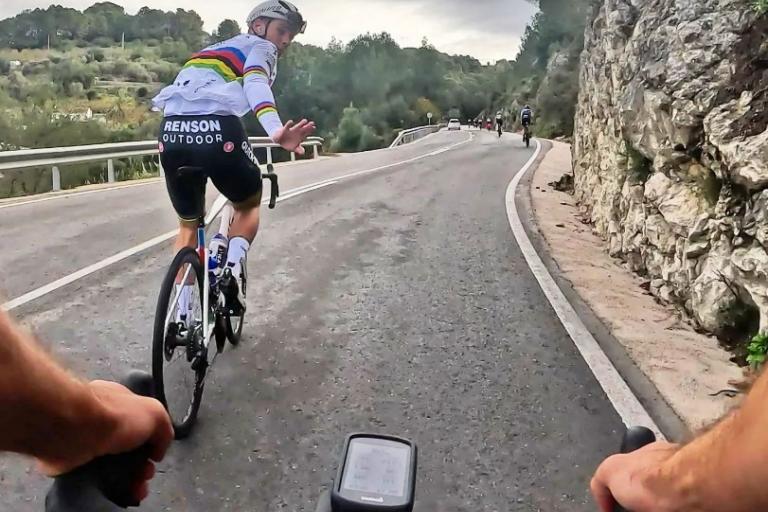
“I’ll be most put out if the next TikTok sensation is ‘following wheezing old men up hills’”: Reader reaction to Remco’s ride along
Judging by the comments section, the majority of you agree with Remco Evenepoel’s decision to expel an amateur interloper (and videographer) from his back wheel during a recent interval session in Calpe.
Here’s what you had to say…
PRSboy: “I remember Geraint Thomas saying in one of his books how annoying it is when people tagged on, uninvited and with no introduction when he was in the midst of a gruelling session.
“It just looks stalker-ish and weird.”
Rendel Harris: “My original thought with Remco was that's a bit precious – you're going to spend most of the season with the world's best riders on your back wheel, surely you can cope with a fan doing it for a little while?
“But on reflection, if he's doing intervals then someone following him at the same speeds and wattage could potentially provide useful information for his rivals about his condition and/or what wattage is required to keep up with him, so...
“End of the day though, it is a public road and other people have got a right to ride there as they wish, there's always the turbo if you want to keep it totally confidential, or I'm sure Quickstep could afford to hire a private road somewhere.”
Awavey: “Plus there’s always the trust level, Remco can probably trust his pro colleagues not to ride into his back wheel and take him out, some random type guy probably not so much.”
Brauchsel: “Also it's just weird. It’s unsettling enough having a stranger on your shoulder anyway, let alone having them filming you. I'll be most put out if the next TikTok sensation is ‘following wheezing old men up hills’.”
Let’s hope not…
17 January 2023, 16:51

“I’ve been thinking about this race for four or five months”: Pello Bilbao says Bahrain-Victorious targeted Tour Down Under prologue by preparing “special bike”
Pello Bilbao’s extreme, aesthetically appalling shifter position during this morning’s Tour Down Under prologue may only have been enough for 25th amidst an unseasonal Adelaide downpour, but at least his Bahrain-Victorious team continued their successful streak of innovative viral tech breakthroughs.
> Has the peloton found an aero loophole to the UCI's minimum bar width rule?
Reflecting on his performance after the rain-soaked prologue, Bilbao confirmed that his turned-in bars were the result of months of preparation from Bahrain-Victorious – the same brains trust that came up with Matej Mohorič’s Milan-San Remo dropper post last year – as he targets the Tour Down Under GC, but that an untimely spell of bad weather scuppered the full implementation of these plans.
“We worked pretty hard to do our best. I’ve been thinking about this race for four or five months,” the 32-year-old told Cyclingnews.
“We prepared a special bike and I used the position to get as aero as possible. I rested my wrists on the bars as per the UCI rules and held the levers with my hands. It seemed to work well.”
Pello Bilbao's lever setup for the Tour Down Under Prologue was extreme 😲
📸 @GettySport
______
🇦🇺 #TourDownUnder pic.twitter.com/aDojQ8v9VK— Velon CC (@VelonCC) January 17, 2023
He continued: “I like to race in the rain but it would have been better if we’d all raced in the same conditions. We prepared a special bike but in the end I couldn’t take all the risks I’d hoped to take. I had to race with a cool head and think about the battle for the overall classification without thinking too much about the stage.”
Maybe next time Pello. Though judging by the state of those bars, maybe not…
17 January 2023, 13:26
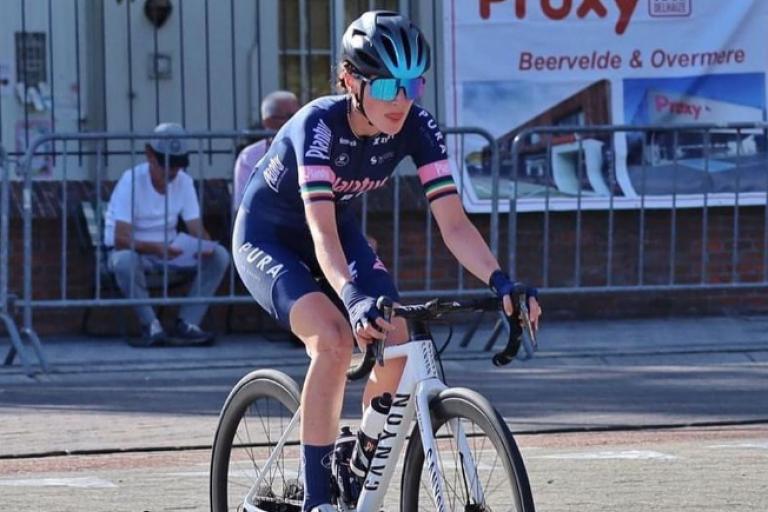
“When I see the impact my body made on the car… it is a miracle I’m still alive”: Former Irish champion Imogen Cotter looks ahead to the new season, twelve months after being hit head on by speeding motorist
At the start of this month, Imogen Cotter was named as part of Women’s WorldTour outfit Fenix-Deceuninck’s new development squad, alongside British cyclocross prospect Anna Kay.
Former Irish champion Cotter’s place on the third-tier team – which formed out of her old Plantur-Pura squad – is remarkable not only because she took up cycling just four years ago, at the age of 25, but because twelve months ago she was worried that she may not be able to ride a bike again.
Last January, weeks before she was set to make her debut for Plantur-Pura, Cotter was training near her new home of Girona when she was struck head-on by a speeding motorist who was overtaking a cyclist on the other side of the road.
Following the collision, after which Cotter said she felt “so lucky to be alive”, the Co. Clare rider had plates and metal screws inserted into her patella, and plates were also inserted on the outer and inner bones of her forearm. According to the 29-year-old, scans at the time showed that there “was no cartilage left in my right knee”, which also required 40 metal staples to ensure the wound healed, while the ruins of her Canyon bike showed the frightening scale of the impact.
After months of recovery and gruelling rehab, Cotter miraculously made her return to the peloton in August and was even able to ride the Tour de Romandie, won by Ashleigh Moolman, in October.
Speaking to the Irish Independent last week, Cotter reflected on the life-threatening crash, as well as her ambitions for 2023 with Fenix-Deceuninck.
“I was literally hit so hard by a speeding van,” she says. “It’s something that you can only see in hindsight. I guess when it happens, it’s kind of like [you’re on] autopilot, but when you look back, especially for me, when I actually see the impact my body made on the car – and the damage that my bike took – I think it is a miracle that not only am I still alive but that I can live independently. The fact that I don’t have a traumatic brain injury, I really, really do thank God every day for that.”
The 29-year-old Irish rider says Davide Rebellin’s tragic death in November, when the retired Italian pro was killed after being struck by a hit-and-run lorry driver while training near his home, hit her in the pit of her stomach.
“I was really shook from that. I was on my way to training camp and I actually felt really emotional about it,” she said. “Because, for sure, it could have been me. It’s a very real thing to realise how close you were…”
She continued: “I didn’t think I was going to be a competitive cyclist again. I was clinging on to the hope. As time is going on, I was thinking, ‘Am I ever going to be able for the professional peloton again?’ I was thinking, ‘Oh, maybe I could become a para athlete’.
“I mean, there’s a difference between having your body back as a normal person, but not as an athlete. It was only when I went to Belgium and I had my surgeries there; that was game-changing for me because, before that, I just didn’t know how I was going to live a normal life. Because I couldn’t walk without a limp… There was no way I could cycle. I wasn’t cycling at all.
“They got me the appointment with the knee specialist. I’d be on a waiting list still if I hadn’t had the team’s contacts. The same doctor that operated on my knee also operated on [Mathieu] van der Poel’s knee.
“That was life-changing, what an amazing doctor. I feel like I owe him everything. I feel like he saved my life. I actually wrote him a Christmas card, and I said that to him.
“To think back to how hopeless and terrified I was before I went to him and to be in this stage now, where I’m actually looking ahead to cycling a whole season next year, that’s down to doctors like that.”
Cotter aims to start her season at the Setmana-Ciclista-Valenciana next month, and has praised both her team and the women’s peloton in general for giving her the chance to recover and return to the sport gradually and on her own terms.
“I look back with such awe that I got through it because when you’re in it, you’re thinking one day at a time, one day at a time,” she says. “But I knew so little of what was ahead of me; about how hospitals work; how police departments work; about how having a lawyer worked. I guess my naivety really served me well, and thank God that I was so naive.
“Because now I look back and I’m like, ‘F***, if I knew what was going to be ahead, I would’ve given up’. It was just such a monumental effort to get back to this stage.”
17 January 2023, 16:13
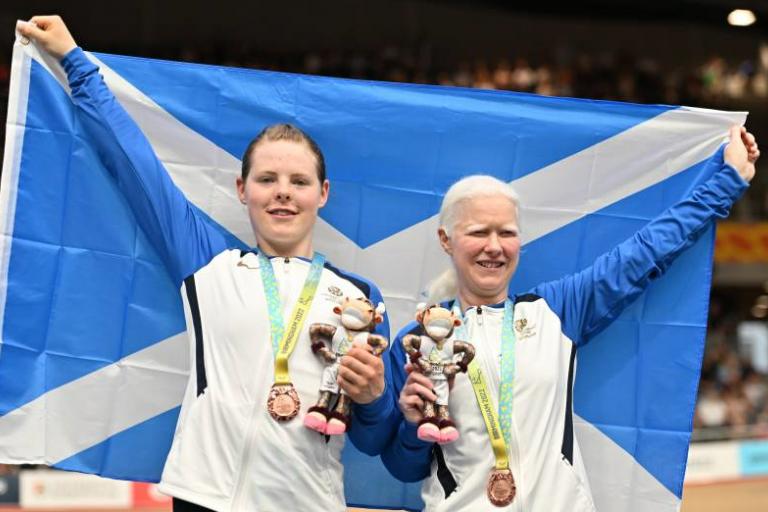
Three-time Paralympic gold medallist Aileen McGlynn announces retirement from cycling
Three-time Paralympic gold medallist Aileen McGlynn announced her retirement from cycling today, bringing an end to a glittering 20-year career.
The 49-year-old won three Paralympic gold medals (two in the kilo and one in the individual pursuit) in 2004 and 2008, along with four rainbow jerseys at the para-cycling world track championships between 2006 and 2009, and a European kilo title in 2005.
McGlynn continued to pick up medals on the highest stage throughout her career and, after a spell away from the sport, returned with former pilot Helen Scott to take silver in the kilo at last year’s Tokyo Games, securing her personal best time in the process at the age of 48.
“We won🥈rather than lost 🥇”
48-year-old Aileen McGlynn ended retirement in 2020 to rejoin pilot Helen Scott for the 1st time since 2012.
“I was just riding my bike & not competing last year, but I always felt I hasn’t peaked, so this is just amazing & I’m so chuffed.” pic.twitter.com/bEyhgtqGsU
— Nick Hope - the athlete’s journalist 👨💻🏊🏻♂️ (@NickHopeTV) August 26, 2021
She was appointed an MBE in the 2006 New Year Honours, which was upgraded to an OBE three years later.
Her final flourish on the track came at last year’s Commonwealth Games in Birmingham where, representing Scotland, she bagged silver and bronze in the sprint and kilo respectively.
“I’ve been doing this for 20 years, and at some point you’ve got to move on and do other things!” McGlynn said in a statement released today.
“I feel like I’ve achieved everything I wanted to in cycling – the opportunity to come back and do a really good time in Tokyo and win a silver medal, I could have finished my career at that point.
“It’s been a while since I made the decision, but I felt I should make it official!
“I’m pretty pleased and proud of what I’ve achieved. I’m particularly pleased that I’ve carried on to the age of 49 and broken down barriers in terms of age. I came back faster, stronger and with better power numbers in 2021 in Tokyo, so I’ve proved myself, I’ve proved my longevity.
“I’m also really pleased with the world records I’ve set in the past, and the medals I’ve won at Paralympic level – three gold, three silver and a bronze – I’m really happy with what I’ve done and the experiences I’ve had.
“Travelling to so many different countries, competing right across the world; I’d probably never have visited a lot of these countries had it not been for cycling – it’s been lifechanging. I’m really glad I’ve done this for the last 20 years – it’s been hard, but it’s been very rewarding too.”
The Paisley-born track cyclist also noted that her 20-year career has witnessed a profound change in the stature and perception of disability sport, though she argues that there’s still a long way to go.
“Participation is much higher now than it was when I started 20 years ago – I think there were three athletes and two pilots on the British Para-Cycling Team when I started with GB! There’s a lot more funding and investment to improve the Paralympic side of the sport, and it’s certainly more inclusive,” she said.
“London was so good for highlighting Paralympic sport, but I don’t know how much that has transferred into daily life for disabled people, as I’ve not been back in the workplace to know.
“I think there’s still a long way to go for disabled people, but then there’s still a long way to go for things like women’s rights, so it’s not going to be solved overnight, the same as for any of these inclusivity and equality issues.”
17 January 2023, 15:49
Yep, that’s much better…
I'm so glad through traffic is permitted on Brick Lane again. Huge improvement, well done everybody. pic.twitter.com/tGXdEcAkT8
— Mark (@markvauxhall) January 17, 2023
The pavement parking really enhances the pedestrian environment too pic.twitter.com/Rj04fs6b3U
— Mark (@markvauxhall) January 17, 2023
17 January 2023, 15:29
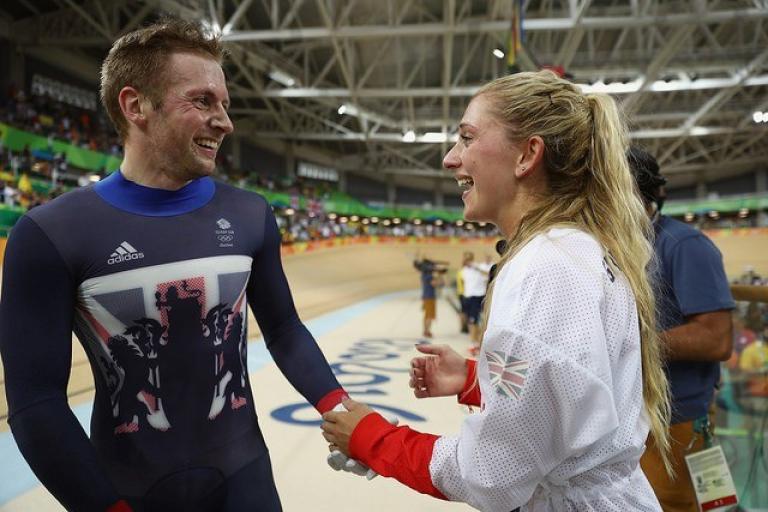
Laura and Jason Kenny become patrons of Cyclists Fighting Cancer charity
Laura and Jason Kenny, Great Britain’s most decorated female and male Olympians respectively, have been appointed as the first patrons for the charity Cyclists Fighting Cancer.
Now in its 17th year, Cyclists Fighting Cancer helped over 8,500 children recovering from cancer by providing them with lightweight bikes, specially adapted trikes, cycling equipment, and support.
“We’re really honoured to become patrons of Cyclists Fighting Cancer and to support their crucial work with children and young people living with cancer throughout the UK,” the Kennys said in a statement.
“Cycling has been such a huge part of our lives for so long, so being involved with a charity which enables some of the most vulnerable children in our society to have their own new lightweight bike or adapted trike to help them in their rehabilitation is something that we are extremely passionate about.
“Cycling is our happy place, especially as a family with our son Albie, we love spending time together outside with all the physical and mental positives this brings, so to be part of making this possible for other families going through such difficult circumstances is very important to us.”
Mike Grisenthwaite, the founder and CEO of Cyclists Fighting Cancer added: “We are thrilled to have the support of Laura and Jason Kenny and couldn’t have wished for better patrons for our charity!
“Their enthusiasm and passion for sport and their understanding of our charity’s mission makes our partnership a very natural fit. We are excited to see what we can achieve together to help raise the profile of CFC and ultimately increase the number of children and families living with and beyond cancer that we can support.”
17 January 2023, 15:14
17 January 2023, 14:50
TrainerRoad CEO Nate Pearson issues statement on price increase – which will be optional for ‘legacy’ members
17 January 2023, 14:13
Cav’s Astana British champion’s kit – Hot or Not?
Now, with all that messy transfer business finally out of the way, let’s get down to the really important stuff.
Cavendish’s new Astana British champion’s jersey – is it a hit or a miss?
The pictures you were waiting for… @MarkCavendish #AstanaQazaqstanTeam pic.twitter.com/wbODn7Yj4E
— Astana Qazaqstan Team (@AstanaQazTeam) January 17, 2023
17 January 2023, 12:46
It’s happening!
Still waiting? pic.twitter.com/rZz1YWeoT1
— Astana Qazaqstan Team (@AstanaQazTeam) January 17, 2023
> BREAKING: Mark Cavendish signs for Astana Qazaqstan
After all the months of constant rumours, collapsed teams, training camp snooping, and terrible attempts at Photoshop, the day has finally arrived – cycling’s worst kept secret appears to be out…
But what are we going to talk about now?
17 January 2023, 12:33
Chicken on bike waits for tram: a local newspaper classic
From mad shifter positions to chickens on bikes – it’s that kind of day, folks…
17 January 2023, 12:19
More on weird handlebargate…
17 January 2023, 11:19
Here we go again…
Here we go again! https://t.co/bUB99804MI #cycling #ice #snow
— road.cc (@roadcc) January 17, 2023
Did I mention it was cold?
17 January 2023, 11:02
The Pulitzer should be on its way any day now…
17 January 2023, 10:43
“Come to Australia they said, don’t forget your factor 50 they said”: Geraint’s fun day out at the Tour Down Under
Oh and come to Aus they said, don’t forget your factor 50 they said… new socks 🤣🤦♂️☔️ pic.twitter.com/W19WfyMSIt
— Geraint Thomas (@GeraintThomas86) January 17, 2023
17 January 2023, 10:19
Grace Brown outsprints Amanda Spratt to win Tour Down Under
🧡: Winner of the Santos Leaders Jersey: @GLBrown321 | @FDJ_SUEZ #TourDownUnder@SantosLtd @Interflora @SANTINI_SMS pic.twitter.com/xL595jZ7eN
— Santos Tour Down Under 🚴🚴♀️ (@tourdownunder) January 17, 2023
Earlier this morning, before the world lost its minds over Pello Bilbao’s handlebars, FDJ-Suez’s Grace Brown showcased her impeccable timing and descending skills to win the overall title at the women’s Tour Down Under.
Amanda Spratt attacks eventual winner Grace Brown on the Corkscrew at the 2023 Tour Down Under (Zac Williams/SWpix.com)
Despite once again coming under pressure from the expected Amanda Spratt attack on the steep Corkscrew climb, ceding 20 seconds to the Trek-Segafredo rider by the top with 7.5km to go, Brown kept her cool and managed to bridge up to her compatriot as they approached the flamme rouge.
With the overall victory assured once the catch was made (thanks to the FDJ rider’s astute pilfering of bonus seconds on the opening two stages), Brown then easily dispatched Spratt to take the stage and the first Tour Down Under GC win of her career.
The final climb up The Corkscrew proved decisive and a two-up attack containing Amanda Spratt and Grace Brown went clear. Ultimately it was Brown who took the stage and the overall at the #TourDownUnder
Watch the race highlights over on GCN+ 👉 https://t.co/8FSJcLLBw5 pic.twitter.com/huyjEyCKzh
— GCN Racing (@GcnRacing) January 17, 2023
“I’m really pleased. The team did an awesome job today, they led me out into the final climb,” she said after the stage.
“I knew that Amanda was going to be really good on the Corkscrew, but I just kept her within distance knowing that I could potentially catch her back on the descent, and I was able to do it.
“I had to keep pushing on the descent, there was no freewheeling, that’s for sure. I actually put a bigger chainring on this morning knowing that this might be a scenario.
“Really cool to take this victory after some awesome work from my team.”
After obtaining a PhD, lecturing, and hosting a history podcast at Queen’s University Belfast, Ryan joined road.cc in December 2021 and since then has kept the site’s readers and listeners informed and enthralled (well at least occasionally) on news, the live blog, and the road.cc Podcast. After boarding a wrong bus at the world championships and ruining a good pair of jeans at the cyclocross, he now serves as road.cc’s senior news writer. Before his foray into cycling journalism, he wallowed in the equally pitiless world of academia, where he wrote a book about Victorian politics and droned on about cycling and bikes to classes of bored students (while taking every chance he could get to talk about cycling in print or on the radio). He can be found riding his bike very slowly around the narrow, scenic country lanes of Co. Down.
Add new comment
19 comments

IanMSpencer
|
2 years ago
4 likes
https://twitter.com/MarxOutThere/status/1615150016766824449?t=rpoULgL2lq...
Peak cycling inanity?
"No, never use a bell while cycling. It is too dangerous. You are creating a situation where soneone else will need to respond to your bell which has a chance it could result in death or injury."


It's shitty behaviour to follow pros on training camps like this. I get it's a public space and it's not technically illegal but the pros are often secretive of their training so as to not give rivals an advantage. Being followed by joe bloggs everywhere, when you're not even in race season sounds nightmarish.



Rendel Harris
|
2 years ago
0 likes
My original thought with Remco was that's a bit precious - you're going to spend most of the season with the world's best riders on your back wheel, surely you can cope with a fan doing it for a little while? But on reflection, if he's doing intervals then someone following him at the same speeds and wattage could potentially provide useful information for his rivals about his condition and/or what wattage is required to keep up with him, so...end of the day though, it is a public road and other people have got a right to ride there as they wish, there's always the turbo if you want to keep it totally confidential, or I'm sure Quickstep could afford to hire a private road somewhere.




Also it's just weird. It's unsettling enough having a stranger on your shoulder anyway, let alone having them filming you. I'll be most put out if the next TikTok sensation is "following wheezing old men up hills".
Personally I'd be amazed if anyone going slowly enough to be behind me could actually stay upright.


I agree that it looks like he's just sucking money out of his stunts and I wouldn't be amused either to have a wheelsucker sticking to me like a leech.
But I'll give it to the tosser that he does manage to hang on, even though he's redlining. Not so many people could pull that off.

brooksby
|
2 years ago
3 likes
The Cult of Bike Helmets (slate.com)
https://road.cc/content/forum/cult-bike-helmets-slatecom-298673

lesterama
|
2 years ago
9 likes
This study on how we Brits accept more harms and risks from motor vehicles presumably affects how people treat people on bikes.
https://www.theguardian.com/world/2023/jan/17/motonormativity-britons-mo...

Latest Comments
- David9694 38 min 43 sec ago
Bradford-on-Avon police chase ends in crash https://www.wiltshiretimes.co.uk/news/24914082.bradford-on-avon-police-c...
- mdavidford 48 min 42 sec ago
Not if you count the binary ones.
- Joe Totale 1 hour 2 min ago
Indeed. For example as this review highlights, this case doesn't work for larger smartphones whilst a sandwich bag will fit all modern phones so in...
- chrisonabike 1 hour 11 min ago
Since it doesn't go anywhere useful (yet) ... why not call it a cycle path?...
- JMcL_Ireland 1 hour 21 min ago
It looks like a lot of watch for the money, but there doesn't seem to be any way to sync to Garmin Connect other than using something like Tapiriik...
- OldRidgeback 1 hour 29 min ago
That's an appalling case and an extremely lenient sentence given it sounds very like a racially aggravated assault. I assume the attacker is an...
- eburtthebike 1 hour 49 min ago
"The strength of community feeling around this was very vocal........"...
- BPhillips 3 hours 9 min ago
Car paint is a good idea, but my previous attempts haven't been good, so I'll leave it to someone that knows what they're doing!
- mdavidford 3 hours 9 min ago
Maybe someone stuck all their stuff to the ceiling.
- super_davo 3 hours 48 min ago
Jeez you're all cynical... ...

